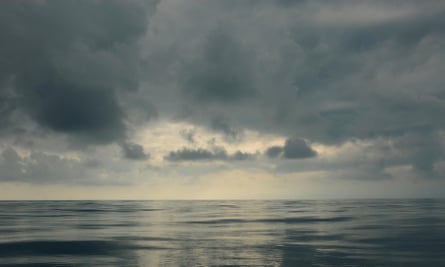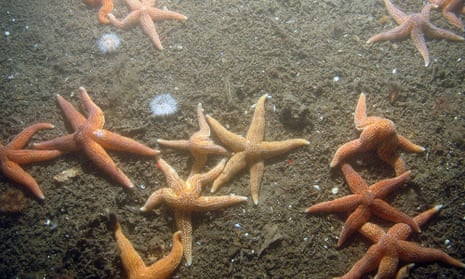Government proposals to ban destructive bottom trawling fishing in the Dogger Bank, announced on Monday, marked a “really big day” for Britain’s seas, conservationists said.
Under proposed bylaws put out for consultation by Britain’s Marine Management Organisation (MMO), bottom trawling, which involves weighted nets being dragged over the sea bed, would be prohibited in the Dogger Bank special conservation area, alongside three other English marine protected areas (MPAs). There are 40 offshore MPAs in England and 76 in the UK.
Conservationists said the move to properly protect an area the size of south Wales would help restore and preserve important habitats. The Dogger Bank MPA, which is 12,300 km2, is a vital North Sea breeding ground for commercial species including cod and whiting as well as sand eels, a food source enjoyed by kittiwakes, puffins and porpoises. But they warned that the proposals, put forward under the Fisheries Act, to give proper protection to just four MPAs would only tackle the “tip of the iceberg” in terms of reversing declines in marine wildlife.
Nearly a quarter of UK territorial waters are covered by MPAs, set up to protect vital ecosystems and species, including harbour porpoises and dolphins. This network of parks is a symbol of the government’s “world leading” target to protect 30% of ocean biodiversity by 2030.

But more than 97% of British marine protected areas are being dredged and bottom trawled, according to data shared with the Guardian.
Conservationists, who describe MPAs as “paper parks”, called for a total fishing ban in protected areas. The government argued that, before Brexit, it did not have control over fishing rights.
The environment secretary, George Eustice, said: “Now that we have left the common fisheries policy, we are able to deliver on our commitment to achieve a healthy, thriving and sustainable marine environment.
“The UK has already established an impressive ‘blue belt’ covering 38% of our waters and our Fisheries Act has provided us with additional powers to go further to protect our seas around England. This proposal to introduce bylaws to safeguard four of our precious offshore marine protected areas shows how we are putting these powers into action.”
In a statement issued by the MMO, the chief executive, Tom McCormack, said: “This consultation is a big step forward in agreeing measures that will help protect and revive important marine habitats, vital to the unique and vibrant marine life that live within them.”
Dr Jean-Luc Solandt, a specialist in MPAs at the Marine Conservation Society, said: “It is a really big day for Britain’s seas, where bottom trawling has degraded the environment for 100 years. It’s the start of us having a pride in our seas again and it makes my job worthwhile.”
“The Dogger Bank is the size of south Wales, so what’s very exciting is that, at last, we have a conservation measure that will recover something. It’s good for recovery of biodiversity and for resilience.”
Chris Thorne, an oceans campaigner at Greenpeace UK, welcomed the news but said the four MPAs were the “tip of the iceberg” and urged the government to go further.
“We need to see the detail of these proposals, but if the government is indeed considering a total ban on bottom trawling in these four protected areas, then it’s good news,” he said.
It showed the government was prepared to use its new Brexit powers to properly protect our seas, he said, and called for all MPAs to be properly protected.
“If the government chooses to follow this consultation approach for a handful of marine protected areas at a time, it will be many years before the entire network is properly protected. Our oceans can’t wait that long.”
Last September Greenpeace dropped giant boulders from its ship into the Dogger Bank MPA in order to create an exclusion zone for trawlers.
A number of NGOs, including WWF and the Marine Conservation Society, have accused the UK, the Netherlands and Germany of breaching the EU habitats directive by failing to protect Dogger Bank from bottom-impact fishing, while the Blue Marine Foundation mounted a legal challenge to what it claimed was illegal fishing in the area.

Melissa Moore, head of policy UK at Oceana, said: “Government bylaws to ban bottom-towed gear in four marine protected areas are welcome, but they urgently need to introduce bylaws to ban this activity in all MPAs, not just a few.
“We were shocked that [the] government recently issued new licences for UK and EU vessels to continue fishing in UK waters regardless of the impact of bottom-towed fishing gear on marine protected areas, which is contrary to national and international conservation laws and agreements, so there’s a legal as well as scientific imperative for an immediate ban across all MPAs.”
The MMO’s proposed bylaws seek to prohibit the use of bottom-towed fishing gear in all four sites and introduce additional restrictions for static gear in two of the sites. The other MPAs are the Inner Dowsing, Race Bank and North Ridge special area of conservation, off the Lincolnshire and north Norfolk coasts, the South Dorset MPA and the Canyons MPA, off the coast of Cornwall.
The proposal was condemned by the National Federation of Fishermen’s Organisations (NFFO), which described it as taking a “sledgehammer” to the fishing industry, already suffering from export delays for fish and shellfish post Brexit.
Dale Rodmell, assistant chief executive at the NFFO, said the fishing community had not been warned about the move. He said: “This changes the whole calculus on where it was expected the balance would lie for sustainable fisheries access in meeting site conservation objectives. The proposals amount to a further sellout of fishing. It augurs ominously for other areas and for fishing communities in our increasingly crowded seas.”
